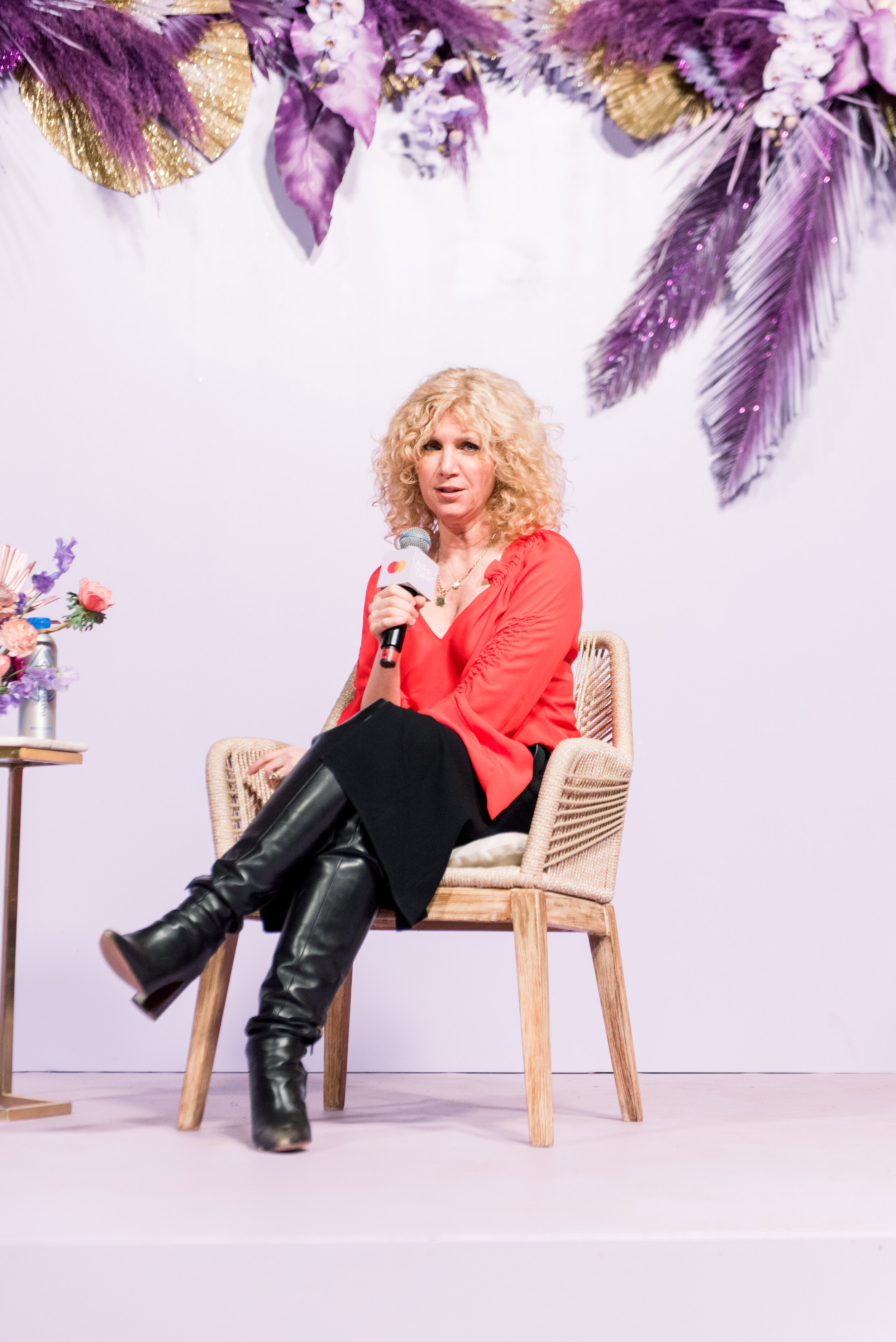"I Maxed Out All of My Credit Cards and Lived Off Savings"—Now She's Built a $100M Company
CAULIPOWER CEO, Gail Becker gets real about bootstrapping, raising money, and running a multi-million dollar business.
You asked for more content around business finances, so we’re delivering. Welcome to Money Matters where we give you an inside look at the pocketbooks of CEOs and entrepreneurs. In this series, you’ll learn what successful women in business spend on office spaces and employee salaries, how they knew it was time to hire someone to manage their finances, and their best advice for talking about money.
“I took a risk and bet on myself. That’s the hardest part. If you don’t bet on yourself, who else ever will?”
—Gail Becker, CEO of CAULIPOWER
Money: like religion and politics, it’s off the table but if there’s one thing we need to talk about more, it’s money, especially as women. Why? Because more women than ever before are starting their own businesses and they’re growing at twice the speed. In fact, a new report found that 42% of all firms are female-owned and women started 1,817 businesses a day in the past year. Despite that, women-owned businesses still struggle to get crucial financing so we need to ditch the taboo and open up a public dialogue to better understand how to raise it, manage it, and grow it.
Someone who is boycotting that ban is the founder, and CEO of CAULIPOWER, Gail Becker. Since 2017, Becker has built a $100m company and completely disrupted the food industry to become the #1 better-for-you pizza in the U.S. At our recent LA2020 conference, Becker had some no-filter money advice, especially around the topic of raising it. Having taken on two rounds of investment for CAULIPOWER, she knows each entrepreneur must make the right choice for them. “Just because you can raise more money, doesn’t mean that you should” she told the audience. “It’s not a symbol of how successful you are… or will be.”
Becker also decided against a friends and family round for her startup. “It made me nervous to play with my friends’ and family’s money,” she explained. “I waited as long as I could before seeking outside funding. I used all of my own money initially and maxed out all my credit cards.” There are different ways to fund your business and, ultimately, it needs to come down to what you feel most comfortable with and what your business needs are,” she explained. “I took a risk and bet on myself,“ she said. “That’s the hardest part. If you don’t bet on yourself, who else ever will?”
So, we tapped the powerhouse founder and CEO to share more of her money lessons, mistakes she’s made, and advice for small business owners. Read on and grab a pen, you’ll want to write these down.
On bootstrapping the company in the beginning…
When I first started CAULIPOWER, my goal actually wasn’t to make money. My dad, who was an entrepreneur and a Holocaust survivor, had recently passed away, and it made me recognize the fragility of life. I had been working my way up the proverbial ladder of corporate America, and then decided that I really didn’t like the view. I wanted to do something more meaningful with my life and I realized that I needed to make a change. That, along with my frustration in what I was seeing in the freezer aisle, created an ‘aha' moment that inspired me to launch CAULIPOWER.
My dad had left me with a small amount of money, and I knew the best way to honor his memory was to follow in his entrepreneurial footsteps. I knew how hard my father worked for every dollar he made, so I spent each one cautiously. I also put in a fair amount of my own money and lived off my savings. On a personal note, it was an interesting transition for me. I was coming from a comfortable job in corporate America with a comfortable salary, and I was used to a certain lifestyle.
When I started CAULIPOWER, I said goodbye to that life and paid attention to every dollar that I was spending, both personally and for the company. I downgraded my lifestyle significantly, saying goodbye to any shopping (outside of the grocery store) and vacations, and even sold most of my former wardrobe such as purses and shoes online. Even that wasn’t enough to sustain the launch of CAULIPOWER, so I maxed out all of my credit cards and tapped into more of my savings.
While this was the right decision for me, everyone has to choose the route that makes sense for them. For me, this was the only way I could bring my vision to life. I was nervous to take money from friends or family, but that doesn’t mean that’s the wrong choice for others. In hindsight, I have several friends and family who now wish I would have asked. At the time, I just followed my gut and made a choice about how I could make things work without negatively impacting others.
On raising money twice since then…
I raised money for a few reasons. First, the frozen food industry is an extremely cash-intensive business. You have to make the product before you can sell it, and there’s a pretty quick need for money given cash flow. When it comes to raising money, timing is incredibly important. I learned quickly that you should try and build the business as much as possible before you raise money. Why? The smaller your business is, the more of the company you will have to give away when you raise money in exchange for equity. Ideally, it’s best to try and hold off until you’ve made some actual sales.
Having said that, one of the worst things you can do is starve a business from cash. Cash is like fuel. We need it to make our products, to pay for promotions, to hire staff, and to market the brand. The timing of it all is a delicate balance between raising too much money, forcing you to give away more of the company when it is of the least value and starving the business, stunting its growth and first-to-market advantage.
“Just because you can raise more money, doesn’t mean that you should. It’s not a symbol of how successful you are or will be.”
On the most surprising part of the venture capital process…
I was surprised at how personal the process became. It would be easy for someone to interpret reactions as a reflection of the quality of one’s idea. If a VC didn’t want to invest in CAULIPOWER or wanted to wait for more data, I questioned myself. What did that say about my idea? The reverse was also true. When you find a partner that believes in you and is prepared to invest money into your business, it can be an incredible confidence boost. It’s a moment when you finally think, maybe this idea is not so crazy after all?!
One of the biggest mistakes that some people make during the fundraising process, is the instinctual desire to take money from the first person that offers it. You should always try to take ‘“smart” money—money from people who know more about the industry, category, and process of building a company than you do. What’s most important is to take money from people who will work hard for you and your idea.
Another part of the fundraising process that surprised me was how similar it was to, well, dating?! Remember, they’re not just interviewing you; you’re interviewing them too! You have to ask yourself ‘who do you want to be in the trenches with you for the long-term? Who will be there for you when the times and decisions get tough—because they will! Who shares your vision?
On the most common mistakes people make when raising money…
Raising too much. Just because you can, doesn’t mean you should. The ability to raise large amounts is not an indicator of the success of your business, rather it’s an indicator that a lot of people will be counting on you and you better deliver. It’s important to raise what you need, which should be enough to hold you over for a while, but not forever. From there, you can build the company to something bigger, then raise more money when it becomes more valuable. My first round of funding was $2M.
“One of the worst things you can do is starve a business from cash—cash is like fuel. ”
On the three crucial elements, every pitch deck should include…
First, you need to show the potential of the company or the white space. Why is this the right business at this time? What hole are you filling that currently doesn’t exist? Another crucial element is the data. You should try and show as much data as you can, even if you have to buy some of it. Show the real performance of your product if it's currently in stores, or use other competitive data to give a sense of how it might do. If it’s not already in the market, you need to prove why you believe it would do well, and this is best accomplished by definitive proof points. Show them that you have done your homework and that you don’t expect anyone to just take your word for it.
Finally, you need to show your passion. Most investors are not just investing in the business; they’re investing in YOU, the entrepreneur. If you're not passionate—and confident—about your own idea, then it really doesn't matter how good of a business plan you have.
On how much she paid herself in the beginning…
I didn't pay myself in the beginning. I lived off of my savings from about May 2016 to September 2017. Once I got VC funding, they made me take a salary and I’ve had the same one ever since. For comparison purposes, it is less than 1/5th of what I used to make when I worked in the corporate world… but I couldn't be happier.
On her first hire…
My first hire was someone who helped me fill out the deluge of paperwork I was facing from the retailers, brokers, and distributors. I realized all the time I was spending with paperwork was a huge opportunity cost and that my time would be better spent in other areas of the business.
On the first big expense as a business owner…
The first order I placed to make the first product.
On when she hired an accountant…
One of the best things about the economy we live in is that you can hire contractors to help you with just about anything. Thanks to some referrals, Google, and some other people I had met in the industry, I came across an agency that performed CFO duties for-hire for small companies. As soon as I got my first order, I knew I had to hire them.
I strongly believe that the most important thing to know as a first-time entrepreneur is to know what you don’t know and then hire around it. Many entrepreneurs mistakenly believe that they somehow need to know all aspects of their business. Nothing could be further from the truth. Know what you know and then hire experts to fill in the gaps.
“Know what you know and then hire experts to fill in the gaps. ”
On the most important area for business owners to focus their financial energy…
Put it into making the best product or service you possibly can. At the end of the day, you can have everything else figured out, but if you don’t have a product that people want, nothing else matters.
On why women should talk about money and business more…
When I was in my first marriage and at my old job, I’m embarrassed to admit that there was a lot I didn’t know about my own finances. I wasn’t financially illiterate, but I never made it a priority to become informed. When I got divorced, the need to become financially literate hit me in the face. I remember thinking, “I will never do that again.”
On having a financial mentor…
I did have some incredible people in the industry (and outside of it) that I looked up to, asked lots of questions of and with whom I’ve stayed connected. I never really had a financial mentor, but then again that wasn’t the primary reason why I started CAULIPOWER. My initial goal wasn’t to make lots of money; it was simply to help people have access to better options. If that’s why you start your business though, then that’s fantastic and finding a financial mentor might be the right choice for you. Now that I am running a business and am responsible for other people, the financial decisions I take on have tremendous importance.
On the money mistakes she’s made and learned from along the way…
I think it all depends on whether you’re new to your industry or if you have a background in it. If I had any sort of experience in the frozen food space prior to launching CAULIPOWER, I probably could have made some different decisions. Since that wasn’t the case, I placed a lot of trust in other people. I trusted that they knew more than I did and there’s a fair amount of trust that I probably placed blindly. In some cases, that ended up having a high price tag associated with it.
“If you’re not passionate—and confident—about your own idea, then it really doesn’t matter how good of a business plan you have. ”
On her best money advice for new entrepreneurs…
You don’t have to know all of the answers. You just have to know enough to hire the people who do. Just because you may not be a financial wizard, it doesn’t mean you shouldn't go into business. Just surround yourself with the right people who can teach you…and ask lots of questions. Daily.
I don’t equate money and happiness. The experience of launching and building CAULIPOWER showed me that one of the reasons I was so hesitant to leave my stable career is that I thought I had a great life. There was this inherent fear that if I lost all of those trappings that I had grown accustomed to, I wouldn’t be happy.
Today people who know me often hear me say “half as rich, but twice as happy” and no sentiment could be truer. Now, I realize that those things didn’t matter at all and the chance to build CAULIPOWER, take a bet on myself and help other people along the way has been the greatest professional joy of my life. I hope these words help to realize the same in you.
To learn more about CAULIPOWER and try their delicious pizzas, visit eatcaulipower.com.
We Scrubbed the Internet for the Best Advice for Startup Founders During the COVID-19 Pandemic
Adapting to the ever-changing circumstances of the crisis is key.
Photo: Smith House Photo
The COVID-19 outbreak is impacting communities—canceling events, shuttering offices, and suspending classes—around the globe. Of course, the focus is (and should be!) on preventing the spread of the disease, but the economic effects of the outbreak are impossible to ignore as companies large and small adapt to the ever-changing circumstances of the crisis.
In the last few weeks, the OECD cut global economic growth projections in half, the JPMorgan Global Manufacturing Purchasing Manager’s Index (PMI) fell to its lowest level since 2009, and U.S. stocks had their worst day since the 1987 stock market crash. Needless to say, supply chain disruptions, facility closures, and staffing deficits can put extra strain on startups.
Here are three things that startup founders can do now to adapt to the ever-changing circumstances, according to the Harvard Business Review.
Set up business tracking and forecasting.
Fluctuations are inevitable in the midst of a crisis. "Put in place rapid-reporting cycles so that you can understand how your business is being affected, where mitigation is required, and how quickly operations are recovering," notes Harvard Business Review. "A crisis doesn’t imply immunity from performance management, and sooner or later markets will judge which companies managed the challenge most effectively.”
Plan for remote work.
With the CDC recommending social distancing and zero-tolerance sick policies to prevent the spread of COVID-19, planning for remote work is essential. “Be clear on your policies—where they apply, how they will work, and when they will be reviewed,” advises Harvard Business Review for the best results.
Microsoft, Google, and Cisco Webex are among a number of tech companies providing free remote working tools during the coronavirus outbreak. Additionally, Slack’s Guide to Working Remotely, Gitlab’s Guide to Remote Work, and Google are all great resources for setting up a successful remote work strategy.
Be a part of the broader solution.
“As a corporate citizen, you should support others in your supply chain, industry, community, and local government,” notes Harvard Business Review. “Consider how your business can contribute, be it in health care, communications, food, or some other domain. Focus on the intersection between acute social needs and your specific capabilities—in other words, live your purpose.”
Head over to Harvard Business Review for more advice on how to lead your business through the coronavirus crisis.
For up-to-date information on the COVID-19 outbreak, we recommend referring to the Centers for Disease Control and Prevention or the World Health Organization.
5 Preventable Startup Culture Mistakes
Hustle hard, but don’t make these common mistakes.
Every founder knows that culture is crucial to a startup’s success — as Fred Wilson says, “If you want to be in business forever, you need to build a culture that sustains the business” — but there are a few common mistakes that startups make when creating their culture:
1. YOU THINK CULTURE JUST "HAPPENS."
Running a startup means your burn rate is always in the forefront of your mind, and as a result, everything takes a backseat to getting to MVP. Culture can be fixed later, right? The truth is that “culture” is just another way of saying “how we work here,” and by the time you get to your MVP, it will be deeply entrenched.
FiveStars’s founder Victor Ho never took the time to officially define the culture— he felt it was too “cheesy.” But as they grew from 40 to 80 employees, their culture got diluted and as people clashed over ways of getting work done. As quoted in Fast Company, Ho described it as “one of the hardest periods of the company.” Rather than waiting to define your culture, consciously shape your culture while you build your MVP. You don’t have to go on an expensive company retreat, or write an elaborate culture deck. It can be as simple as writing down five words that describe your culture and once a month, as a team, discussing whether they’re still appropriate.
2. YOU THINK HIRING MORE PEOPLE MEANS SUCCESS.
Celebrating is so important because success at a startup can be so rare in the first months. It’s comforting to be able to point something that’s a clear sign it’s all working. And as Buffer’s founder noted, “Team size is easy to understand. Sometimes it impressed people when I told them how big the company was, and I was proud to share it.” But the company brought on too many people, too fast, and was forced to lay off 11% of the company. Protect team morale by tracking more accurate measures of success, and find ways to celebrate small wins regularly.
3. YOU SPEND TOO MUCH ON PERKS.
Bribing employees is a common Silicon Valley practice — what else are meals by gourmet chefs, meditation classes, and laundry service but attempts to get more work out of employees? And those bribes don’t come cheap: shrinking VC funds forced Dropbox to cancel its free shuttle and and limit free meals a few years ago.
If you really want your team to do their best work, regardless of your compensation budget, give them meaningful work. Show them how their work is directly impacting the organization, and how the organization is making a difference in the world. In other words, give them purpose. Oh, and don’t worry — “purpose” doesn’t necessarily have to be a product or service that saves the world (though that’s a plus); it just means that you have a compelling vision and mission.
4. YOU OVERWORK PEOPLE IN PURSUIT OF THE PRODUCT.
Signing up for a startup is a commitment; long hours and outrageous goals are part of the bargain. But push too hard, and you’ll flare out. At Zynga, for instance, long hours, “aggressive” deadlines, and an obsession with performance metrics led to a talent drain, and even hampered its ability to acquire companies. To prevent burnout, hold regular check-ins with your team to help them manage workload and stress levels. And don’t forget to check-in with the founder: 30% of founders report being depressed, as opposed to only 7% of the general population.
Again, we’re not saying you won’t spend some long nights and weekends at this office, but don’t make it a cultural norm.
5. YOU DON'T FIRE JERKS BECAUSE THEY'RE SMART.
Hiring the best talent is highly competitive, but ignore the “no asshole” rule at your own peril. Despite their superior skill set, their personality will destroy your team culture, not to mention their productivity. In one of our engagements, we worked with an executive whose attitude turned the rest of the team against him. This led him to protect his own job by guarding his data more and more closely, leaving the startup completely in the dark when making crucial decisions.
The best way to avoid this problem is to carefully screen for jerks during the interview process, listening for self-centered answers and trash talking past employers. (As Raylan Givens of Justified noted, “If you run into an asshole in the morning, you ran into an asshole. If you run into assholes all day, you’re the asshole.”) But if one has slipped past your radar, talk to them and make it clear how you expect their behavior to change. If they don’t shape up, then it’s time to go your separate ways — the rest of the team will thank you.
Written by Paula Cizek, Director of Knowledge & Editorial at NOBL. NOBL is an organizational and team design consultancy that unleashes the creativity and capability of teams through new ways of working.
MORE FROM THE BLOG
ITK: Tips for Co-Founder Success
Finding your ideal mate in business.
Many of us have a vision of launching a business with co-founder who is the perfect compliment to our right brain or left-brain selves. Strong creatives tend to seek business strength and vice versa, but actually finding the perfect fit can be more difficult than we like. This is largely because we 1. Travel in circles that tend to be more like us 2. Don’t understand our own personalities, weaknesses and core competencies 3. Are eager to find someone that when we do we say “YES” too quickly. There is a formula to finding the right partner and setting yourself up for success. Lets dive in.
YOUR INNER GAME
Your capacity to understand your traits as a leader is essential. Are you passive aggressive? Can you hire people well, but struggle with firing? Do you think you are always right? Maybe you have self-worth issues. Or, like me, maybe you are a work-a-holic and treat your business like it’s your first-born. No matter what your unique personality type, it's critical to understand how you work and to be honest about it. Launching a business is not the time to work through your personal baggage, but you are the center of your business so these things do come up. You need to square away personal obstructions and work through anything that might keep you from performing at your optimum. I suggest making a list of how you like to work, what types of personalities you have worked well with in the past, and what might someone else need to know about you to know if you are a good fit for them. Do you like to do things last minute but never miss a deadline? Your potential co-founder will need to know not to worry about your commitment.
"Launching a business is not the time to work through your personal baggage."
Tweet this.
WHAT YOU BRING TO THE TABLE
Aside from bringing a great idea to the conversation you need to stack up your skill sets. I always ask my clients to make lists: what are they really good at, what would they like to learn, and what is something that they would have to hire out/have zero interest in learning. If you are a creative that struggles with business matters or vice versa it's important to itemize the specifics. I work with a lot of clients that are creatives and need a business backbone, and let me tell you, you can be successful doing it on your own, but its definitely easier when you are working with someone who loves MS Excel if you hate it.
MATTERS OF MONEY
Who pays for what? With a biz partnership it's cleaner if both parties can equally split liability and expenses. Not only does this keep things feeling balanced, but there is true shared ownership. If going 50/50 is not a possibility and you are looking for a co-founder to fund the operation, you might actually be looking for an investor. In my experience having a co-founder that's really an investor can muddy decision-making processes. A co-founder should be able to bring something beyond money to the table. They should have skills and expertise that will relate directly to the day-to-day operations. If your co-founder is unable to invest as much money as you are or nothing into the business it’s critical that you stipulate in your operating agreement how your investment gets paid back over time and if/when the company dissolves. At the end of the day this is about playing fair, doing what’s right for the business and yourself.
"Having a co-founder that's really an investor can muddy decision-making processes."
Tweet this.
DOING BUSINESS WITH FRIENDS & LOVERS
In theory it’s a wonderful idea to start a business with a friend or romantic partner. Working with someone you know you already like and have things in common can be very rewarding, but it does require knowing yourself very well to pull this off successfully. Before launching into a business idea with someone you care about make sure to ask yourself and him or her- why now? Why would you two be the best to do this together? What complimentary traits do you have? Discuss how long you want to test the process and have a trial period together before committing to a contract. And yes, you will want a contract! Business amongst friends/lovers can still get ugly and you want to have a contract out of respect for you and them. The goal is to preserve the relationship and possibly launch an amazing business!
TINDER FOR CO-FOUNDERS
I wish there was Tinder for Co-Founders (kind of like Bumble BFF...). But as of now there are only co-founder sites that really focus on technology. Sites like CoFoundersLab, FounderDating, and Angellist are a few places to look if you are looking to start an ecommerce site, otherwise I suggest good old fashion LinkedIn and reaching out in Facebook groups, friends and family. As you would on a first date, you need to make sure to meet your potential co-founder for coffee or a drink and not just trust the phone or email. You wouldn’t marry someone without really knowing him or her right? So why would you risk your financial investment working with someone you don’t know well. (Jessica Alba jokes that partnering up with her co-founder is like an arranged marriage.) I suggest dating around. Dating around means having lots of coffees and working on small projects with someone to test out the personality styles and core competencies. Think of it as an experiment. You could sign an NDA, but really, it's not necessary unless you have a patent pending. Ideas are easy come, easy go, but execution is hard. You need a partner you can execute with that has a shared vision. Don’t expect your first couple dates will yield a co-founder! Be patient.
"Ideas are easy come, easy go, but execution is hard."
Tweet this.
Some people are not co-founder types and that can be as useful to know about yourself as is finding the right partner. Business owners who fly solo must take it upon themselves to find the right help to get things done. It's impossible to think you can run a business all by yourself- you simply won’t scale. You need support, someone to challenge you, and someone to fill the holes.
Syama Meagher is a retail strategist for brands and retailers. She helps entrepreneurs launch and grow fashion business through ecommerce, wholesale and brick & mortar. Syama is a former at Barneys New York, Gucci, AHAlife and Macy’s. To build your brand and create a profitable business check out www.ScalingRetail.com and email hello@scalingretail.com

























